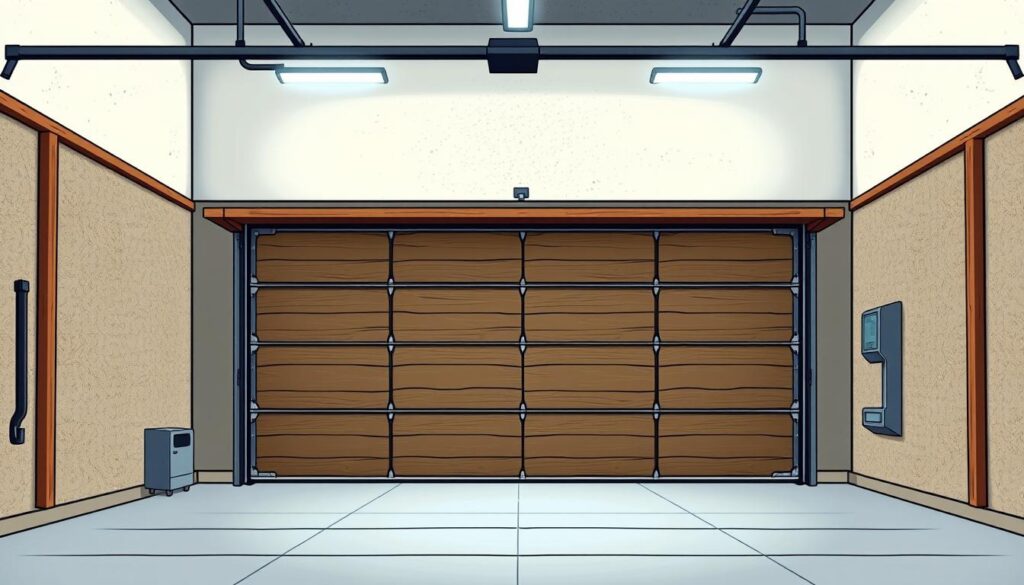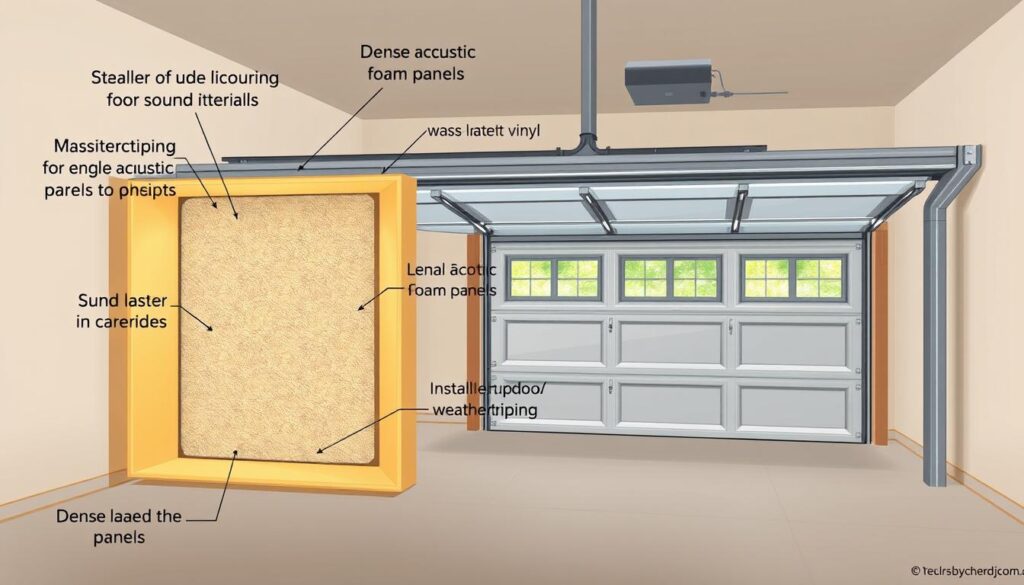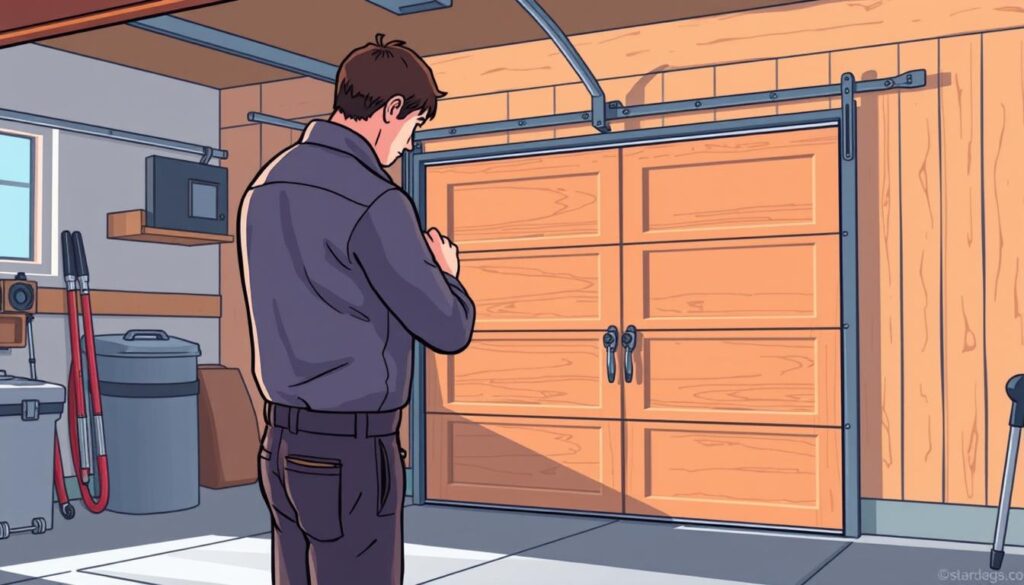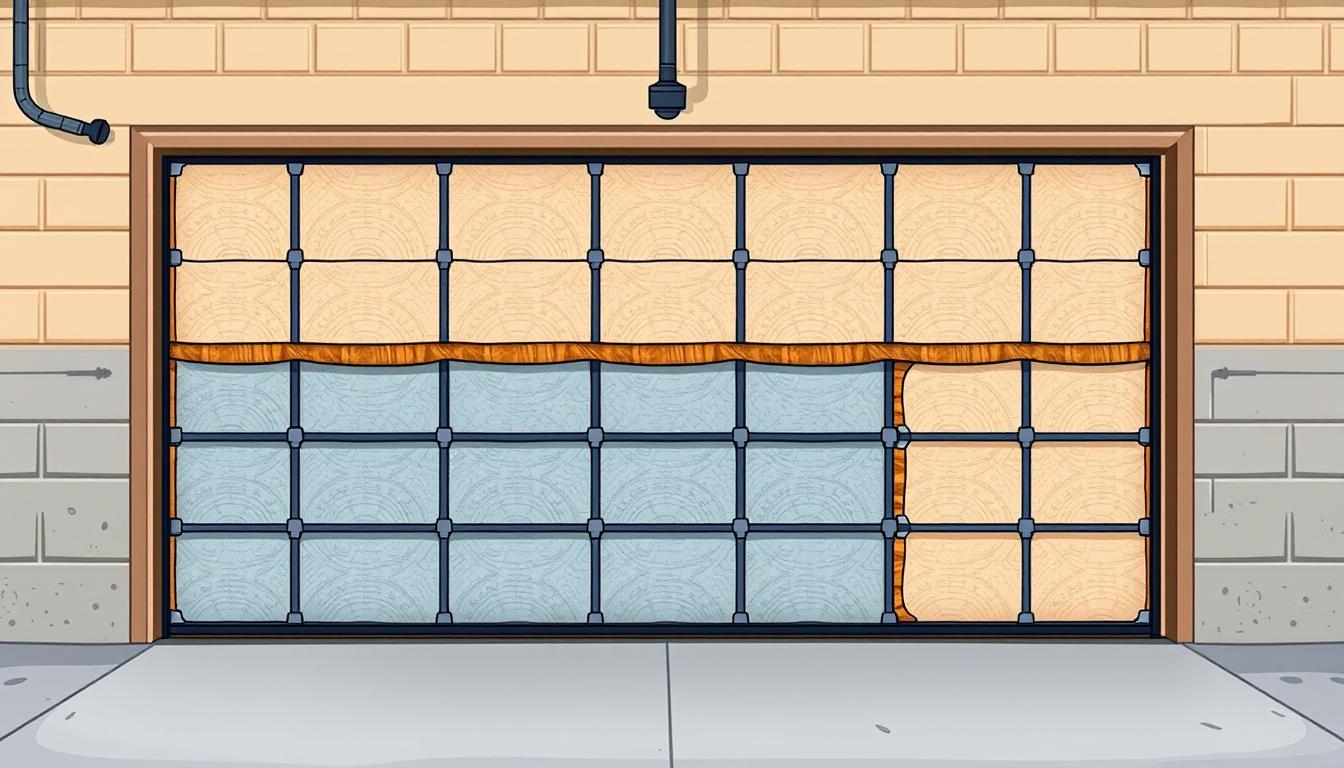A quieter home or workspace is essential for productivity and relaxation. Garage doors are often overlooked as a source of noise. Noise transmission through them can greatly affect your comfort.
Soundproofing your garage door can be a game-changer. It reduces the noise that enters your space, making it more peaceful. This is very helpful for those in noisy areas.
Effective garage door insulation is key to a quieter space. It’s not just about noise reduction; it’s about improving your life quality. We’ll show you how to soundproof your garage door in this article.
Understanding Garage Door Noise Issues
It’s important to know where garage door noise comes from to fix it. Garage doors can make a lot of noise because of their materials and how they work. This noise can bother both homes and workplaces.
Common Sources of Noise from Garage Doors
Several things cause garage door noise. The door’s movement and the opener’s work are big contributors.
The materials and how the door is built also matter. For example, metal doors tend to vibrate and make more noise. A soundproofing expert said,
“The type of garage door you have can significantly affect the level of noise it produces.”
Impact on Living and Working Environments
Garage door noise can really affect homes and offices. In houses, it can interrupt daily life and disturb people, even if the garage is near living areas.
In work settings, too much noise from garage doors can hurt productivity.
To keep a peaceful place, it’s key to reduce garage door noise. Knowing where the noise comes from is the first step. Then, you can start using soundproof garage solutions.
Importance of Soundproofing Your Garage Door
Soundproofing your garage door is very important for both homeowners and businesses. It helps make your living or working space quieter.
It’s not just a nice-to-have; it’s a must for a more comfortable space. Soundproofing brings many benefits, affecting both homes and businesses in big ways.
Benefits for Homeowners
Homeowners can enjoy a quieter home by soundproofing their garage door. It blocks noise from the garage, making your home feel better.
With a quieter home, you’ll have less disturbance. This can even make your home more valuable.
Advantages for Businesses
Businesses, like those in home offices or garages, benefit a lot from soundproofing. A quieter workspace means better focus and a better work place.
Also, for businesses with clients, a soundproofed garage looks more professional.
| Benefits | Homeowners | Businesses |
|---|---|---|
| Reduced Noise Transmission | Enhanced living environment | Improved work environment |
| Increased Property Value | Potential increase in property value | Enhanced professional image |
| Energy Efficiency | Better insulation, reduced energy bills | Cost savings on energy |

Understanding the need for soundproofing garage doors is key. Both homeowners and businesses can make their spaces quieter and more comfortable.
Choosing the Right Soundproofing Materials
To soundproof your garage door well, you need to know about the materials out there. The right ones can cut down noise a lot. This makes your living or work space more comfortable.
Acoustic Panels and Insulation
Acoustic panels soak up sound, cutting down echo and noise in the garage. Adding insulation to them makes your garage door even quieter. Materials like foam board or fiberglass work great for this. They can go inside the garage door panels or stick to the door itself. This kind of material is similar to what you may find in a recording studio.
Weatherstripping Options
Weatherstripping seals gaps between the garage door and its frame, stopping noise from getting out. You can pick from rubber seals, vinyl seals, and adhesive-backed foam tape. The right one depends on the gap size and how long you want it to last.
Soundproofing Mats and Curtains
Soundproofing mats and curtains add extra sound absorption. You can put them on the garage door or walls to block noise. Soundproofing mats are heavy and dense, soaking up sound waves. Curtains can be thick, heavy fabrics that muffle sound.
Knowing about the different soundproofing materials helps you choose the best for your garage door. This way, you can make your space quieter and more comfortable.
DIY Soundproofing Techniques for Garage Doors
DIY soundproofing can make your garage door quieter and cheaper. A few simple steps can greatly reduce garage door noise. This makes your living or working space more peaceful.
Adding Insulation to Your Garage Door
Adding insulation is a top way to soundproof your garage door. It cuts down on noise and keeps the garage warm or cool. Use foam board or reflective insulation kits made for garage doors.
First, measure your garage door panels to figure out how much insulation you need. Cut it to fit snugly between the panels. Use adhesive or double-sided tape to keep it in place. Make sure the insulation covers the whole panel without gaps.
Installing Weatherstripping
Weatherstripping is key for soundproofing your garage door. It seals the gaps between the door and frame, stopping noise from getting out or in. Pick a weatherstripping that’s tough and fits your garage door well.
Start by cleaning the garage door frame area for a tight seal. Then, apply the weatherstripping along the door edges. Press it firmly onto the surface. Check for gaps and seal them up.
Utilizing Garage Door Seals
Garage door seals block the gap at the bottom of the door. They reduce noise and keep out dust, water, and pests. They’re a must for a quiet garage.
Measure your garage door’s width to pick the right seal size. Clean the floor where the seal will go for a strong bond. Follow the manufacturer’s guide to apply the seal, usually by peeling off the backing and pressing it on.

These DIY methods can make your space quieter and more comfortable. It’s important to check and keep up these soundproofing steps to keep them working well.
| Technique | Effectiveness | Cost |
|---|---|---|
| Adding Insulation | High | Moderate |
| Installing Weatherstripping | Moderate | Low |
| Utilizing Garage Door Seals | High | Moderate |
Professional Soundproofing Solutions
Professional soundproofing can turn a noisy garage into a quiet, useful space. This improves both living and working areas. DIY methods help, but sometimes, a pro is needed.
For tough or ongoing noise problems, a soundproofing expert is key. They know how to tackle your garage door’s noise issues. They use the right tools and methods for lasting results.
When to Hire a Soundproofing Expert
Think about a pro if DIY fixes don’t solve your noise issues. This is true if the noise really bothers you or if you’re redoing your garage.
- You’re not sure about the best soundproofing for your garage door.
- The noise is really bad and messing with your daily life or work.
- You’re doing a big home or office makeover.
Types of Professional Services Available
Soundproofing pros offer many services for different needs and budgets. Here are some:
| Service Type | Description | Benefits |
|---|---|---|
| Garage Door Assessment | Experts check your garage door for noise sources and leaks. | They find the best ways to block sound. |
| Custom Soundproofing Solutions | They create plans that might include insulation and soundproof materials. | These plans really cut down on noise and save energy. |
| Soundproofing Material Installation | They put in materials like acoustic panels and curtains. | This makes a big difference in noise levels and your garage’s feel. |
For quiet garage door options, experts can make a big difference. They help you get a quieter space, whether with DIY help or full garage door installations. The goal is a peaceful, useful area.
Budget-Friendly Soundproofing Options
You don’t have to spend a lot to make your garage door quieter. There are many affordable ways to reduce noise.
Soundproofing your garage door is easy and cheap. You can use DIY ideas and affordable materials. This way, you can have a quieter space without spending too much.
Low-Cost DIY Ideas
DIY soundproofing is both cheap and simple. Here are some ideas:
- Adding mass to your garage door with materials like mass-loaded vinyl.
- Sealing gaps with weatherstripping or a garage door seal.
- Installing acoustic panels or soundproofing mats near the door.
These DIY projects are easy on the wallet and simple to do. They’re perfect for those who want to soundproof their garage door without hiring a pro.
Affordable Materials for Effective Soundproofing
The right materials are key to soundproofing. Here are some affordable ones:
- Garage door insulation kits to cut down noise and save energy.
- Weatherstripping to seal gaps between the door and frame.
- Soundproofing mats or acoustic panels to absorb sound near the door.
Choosing the right materials and using them well can greatly reduce noise. And you won’t have to spend a lot.
Assessing the Effectiveness of Your Soundproofing
To check if your soundproofing is working, you need to assess it carefully. This step is key to see if your soundproof garage solutions have cut down noise as planned.
Testing Sound Levels Before and After
Measuring sound levels before and after soundproofing is a smart way to check if it’s working. You can use sound level meters or apps on your phone for this.
By comparing these levels, you can see how much noise has been reduced. This helps you understand if your soundproofing is effective.
Adjusting Your Approach Based on Results
If your first soundproofing steps don’t reduce noise enough, you might need to try again. You could add more insulation, use different materials, or seal more gaps around the garage door.
Keep testing and tweaking your soundproofing plan to get the best results. This way, you can make your living or work space quieter and more comfortable.
Maintenance Tips for Soundproofed Garage Doors
Soundproofing your garage door is just the start. Keeping it maintained is key. Regular care keeps your garage quiet and comfy.
Regular Inspections for Wear and Tear
It’s important to check your garage door often. Look for damage like cracks, dents, or gaps in seals. Check the weatherstripping around the door to make sure it’s sealing well. Fix any damage right away to keep sound out.
Some important things to check include:
- The soundproofing mats or insulation
- The garage door seals
- How well the garage door opens and closes
Keeping Seals and Insulation in Top Condition
To keep your garage door soundproofed, take care of the seals and insulation. Look for moisture or damage on the insulation because it can lose its power. Make sure seals are clean and replace them if they’re worn.
Here are some tips for keeping your seals and insulation in good shape:
- Use mild detergent and water to clean the seals.
- Check the insulation for damage or dampness often.
- Replace any damaged or old seals or insulation quickly.

By following these tips, your soundproofed garage door will stay effective. It will be quieter and more comfortable. Regular care also makes your garage door last longer and work better.
Noise Reduction in Combination with Other Improvements
To get the most out of soundproofing, think about adding it to other garage upgrades. This way, you not only cut down on noise. You also make your garage more useful and cozy.
Enhancing Overall Garage Comfort
Improving your garage’s comfort is more than just about soundproofing. It’s also about better lighting, ventilation, and insulation. Mixing these can make your garage a nicer and more practical place.
Good lighting and air flow are key for a comfy garage. Think about adding LED lighting for less energy use and better light. Also, better air flow can cut down on moisture and improve air quality.
Achieving Energy Efficiency with Soundproofing
Soundproofing can also help save energy by stopping heat from passing through the garage door. You can use insulated garage doors or add insulation to your current doors.
| Improvement | Benefits | Energy Efficiency Impact |
|---|---|---|
| Soundproofing | Reduced noise, improved comfort | Minimal direct impact, but can contribute when combined with insulation |
| Insulation | Temperature regulation, reduced energy costs | Significant positive impact |
| LED Lighting | Better illumination, reduced energy consumption | Positive impact due to reduced energy use |
By combining soundproofing with upgrades like insulation, better lighting, and air flow, you can really boost your garage’s comfort and energy savings. This all-around approach not only lowers noise. It also makes your garage more useful and enjoyable.
Legal Considerations for Noise Control
Legal rules are key in managing noise, affecting your garage door soundproofing. Knowing the laws about noise is vital for your project.
Local Noise Ordinances and Regulations
Noise laws differ greatly across places. It’s important to know the rules in your area. These laws set noise limits at various times.
For example, some laws might stop loud noises during early morning or late evening. Following these rules helps you avoid fines and keeps peace with neighbors.
| City | Noise Limit (Decibels) | Restricted Hours |
|---|---|---|
| New York City | 50 dB (residential areas) | 10 PM – 7 AM |
| Los Angeles | 55 dB (residential areas) | 10 PM – 7 AM |
| Chicago | 53 dB (residential areas) | 8 PM – 8 AM |
Understanding Property Rights and Noise Issues
Property rights are also important in noise disputes. Knowing your rights and duties as a homeowner is key in solving or avoiding noise problems.
“Noise pollution is a serious issue that can significantly impact quality of life. Understanding and complying with local noise ordinances is a critical step in mitigating its effects.” –
When soundproofing your garage door, think about legal needs and how it affects neighbors and the community.
Soundproofing as Part of a Larger Home Improvement Project
Adding soundproofing to your home can make a big difference. It can turn your living space into a quieter, more peaceful place. When you’re doing big home improvements, adding soundproof garage solutions can really up your home’s value.
Soundproofing isn’t just about cutting down on noise. It’s about making your home a more comfortable, calm place. By adding soundproofing to your renovations, you’ll have a quieter garage and better living conditions overall.
Integrating Soundproofing into Renovations
When you’re planning a home renovation, think about how to add soundproofing. You might install quiet garage door options or add insulation to your garage door.
Good soundproofing needs a solid plan. Homeowners should figure out what they need and pick the right materials and methods for their garage.
Adding Value to Your Property
Soundproofing your garage door is a smart move. It’s not just practical; it’s also a good investment. It can make your home more comfortable and more appealing to buyers if you sell later.
A real estate expert said, “A soundproofed garage can really make your property stand out.” This shows the long-term benefits of adding soundproofing to your home project.
“A soundproofed garage can be a significant selling point, setting your property apart from others in the market.”
By adding soundproofing to your home renovation, you’ll enjoy a quieter home. And you might even increase your property’s value.
Conclusion: Creating a Peaceful Garage Environment
Soundproofing your garage door is a smart move for a quieter space. It helps you enjoy a more relaxed or productive area. By cutting down on noise, your garage becomes a better place to be.
Key Takeaways
Soundproofing is about picking the right materials and using DIY tricks. Adding insulation and weatherstripping to your garage door helps a lot. Garage door insulation is key for less noise and saving energy.
Starting Your Soundproofing Journey
Now you know how to soundproof your garage door. First, check out your garage door’s noise problems. Then, pick the best soundproofing materials. With these steps, you can make your garage a peaceful spot that improves your life.

